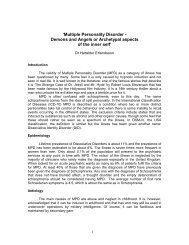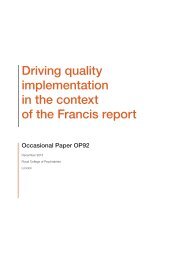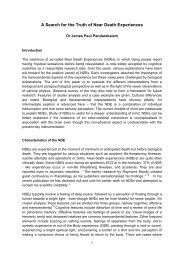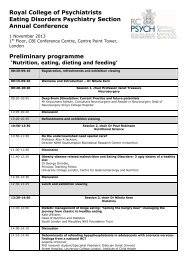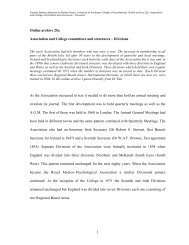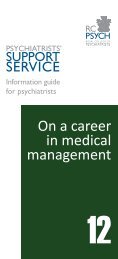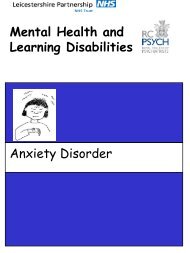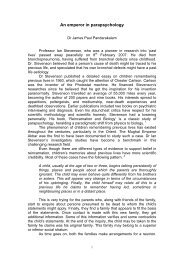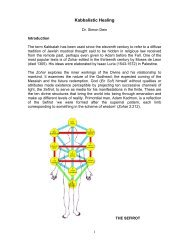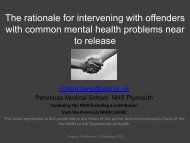Being a Psychiatrist Online Dr Christopher Pell Consultant ...
Being a Psychiatrist Online Dr Christopher Pell Consultant ...
Being a Psychiatrist Online Dr Christopher Pell Consultant ...
You also want an ePaper? Increase the reach of your titles
YUMPU automatically turns print PDFs into web optimized ePapers that Google loves.
DIGITAL PROFESSIONALISM<br />
<strong>Being</strong> a <strong>Psychiatrist</strong> <strong>Online</strong><br />
Rock1997 CC-BY-SA<br />
<strong>Dr</strong> <strong>Christopher</strong> <strong>Pell</strong><br />
@egosyntonically<br />
<strong>Consultant</strong> <strong>Psychiatrist</strong>
OUTLINE<br />
Background<br />
Emerging legal trends<br />
New GMC guidance<br />
Debate<br />
Further reading
GMC UP UNTIL NOW...<br />
No specific guidance on social media<br />
Comes down to probity, professionalism and confidentiality standards in Good Medical Practice<br />
“We would see the principles that apply to this as no different from those that apply in sharing<br />
information in other areas, for example what information about their work doctors might share with<br />
friends at the pub or in other social settings, although obviously the range of people who might have<br />
access to their comments is likely to be wider.”<br />
“In response to queries about this we have taken the view that doctors are allowed, like anyone else,<br />
to have a private life and use of the internet and social networking sites are a part of this for many<br />
people. It is clearly a matter of judgement, about what information doctors choose to share on such<br />
sites and with whom, bearing in mind their professional obligations as a doctor and any contractual<br />
requirements. It is not possible to state categorically what would and would not be acceptable in<br />
relation to these matters as it is likely to depend on many factors, including the nature of the<br />
comments, who could access them, and whether they were posted during or outside work hours.”
FACEBOOK<br />
Total number of Facebook users: 1.06 billion<br />
Daily active Facebook users: 618 million<br />
Total number of Facebook pages: 50 million<br />
Average no. of monthly posts per Facebook page: 36<br />
Total number of Facebook mobile users: 680 million<br />
Total no. of Facebook friend connections: 150 billion<br />
Average number of friends per Facebook user: 141.5<br />
Total no. of Facebook likes since launch: 1.13 trillion<br />
Average daily Facebook likes: 2.7 billion<br />
http://expandedramblings.com/index.php/resource-how-many-people-use-the-top-social-media/
TWITTER<br />
Total Number of Twitter Users: 500 million<br />
Total Number of Tweets Sent: 170 billion<br />
Monthly Active Twitter Users: 200 million<br />
Average Number of Followers per Twitter User: 208<br />
Average Number of Tweets Sent Per Day: 400 million<br />
Average Number of Tweets per Twitter User: 307<br />
Average Time Per Month Spent by Users on Twitter:<br />
170 minutes<br />
Percentage of Twitter Users Accessing Via Mobile:<br />
60%<br />
Most Followed Celebrity on Twitter: Justin Bieber<br />
http://expandedramblings.com/index.php/resource-how-many-people-use-the-top-social-media/
YOUTUBE<br />
One billion unique views per<br />
month<br />
4 billion views per day<br />
60 hours of video uploaded<br />
per minute<br />
Nearly 9 out of 10 (87%) of<br />
UK internet users have used<br />
YouTube<br />
http://expandedramblings.com/index.php/resource-how-many-people-use-the-top-social-media/
YOUTUBE<br />
One billion unique views per<br />
month<br />
4 billion views per day<br />
60 hours of video uploaded<br />
per minute<br />
Nearly 9 out of 10 (87%) of<br />
UK internet users have used<br />
YouTube<br />
http://expandedramblings.com/index.php/resource-how-many-people-use-the-top-social-media/
YOUTUBE<br />
One billion unique views per<br />
month<br />
4 billion views per day<br />
60 hours of video uploaded<br />
per minute<br />
Nearly 9 out of 10 (87%) of<br />
UK internet users have used<br />
YouTube<br />
http://expandedramblings.com/index.php/resource-how-many-people-use-the-top-social-media/
POSITIVE MEDICAL USES OF<br />
SOCIAL MEDIA<br />
“Technology should be like oxygen:<br />
ubiquitous, necessary, and invisible.”<br />
-Chris Lehmann<br />
“If you don’t learn something new<br />
each day on Twitter, then you are<br />
following the wrong people.”<br />
-via @TweetSmarter
POSITIVE MEDICAL USES OF<br />
SOCIAL MEDIA<br />
Networking<br />
Asking questions<br />
Learning<br />
Sharing<br />
Informing<br />
Reconnecting<br />
Educating<br />
Promoting<br />
Entertaining<br />
Employing<br />
“Technology should be like oxygen:<br />
ubiquitous, necessary, and invisible.”<br />
-Chris Lehmann<br />
Discovering<br />
Conversing<br />
Advertising<br />
“If you don’t learn something new<br />
each day on Twitter, then you are<br />
following the wrong people.”<br />
-via @TweetSmarter
POSITIVE MEDICAL USES OF<br />
SOCIAL MEDIA<br />
Twitter:<br />
Keep up to date<br />
Track jobs and other<br />
opportunities<br />
Inform others and share<br />
interesting articles<br />
Public health - track disease<br />
outbreaks, emergencies<br />
Networking particularly for<br />
conferences - #RCPsychIC13<br />
Crowd sourcing platform - ask<br />
your followers<br />
Journal clubs and specific<br />
discussion groups - #meded<br />
#TwitJC<br />
Communicate with colleagues<br />
(and patients?)
POSITIVE MEDICAL USES OF<br />
SOCIAL MEDIA<br />
Facebook<br />
Present a professional image<br />
Create a “fan page” for your<br />
organisation - e.g. RCPsych<br />
Use to disseminate<br />
information<br />
Generate discussion amongst<br />
friends or fans
POSITIVE MEDICAL USES OF<br />
SOCIAL MEDIA<br />
Facebook<br />
Present a professional image<br />
Create a “fan page” for your<br />
organisation - e.g. RCPsych<br />
Use to disseminate<br />
information<br />
Generate discussion amongst<br />
friends or fans
WHY DOCTORS SHOULD<br />
CARE<br />
✤ You are already on-line.
WHY DOCTORS SHOULD<br />
CARE<br />
✤ You are already on-line.<br />
Try Googling yourself - find out what others would see<br />
Your friends, family and patients are all on-line too (and may be<br />
posting information about you)<br />
Likely to continue to increase in next few years<br />
Increasingly pervasive into other aspects of life<br />
Doesn’t interfere with off-line relationships
DEVELOPING LEGAL TRENDS<br />
#twitterjoketrial<br />
Unnamed footballer saga<br />
highlights courts’ ability to pursue<br />
tweeters<br />
Ongoing case in respect of Twitter<br />
users who wrongly identified<br />
Lord MacAlpine<br />
Upshot in UK as of 2011 - all<br />
tweets are considered public<br />
domain material<br />
Material posted is permanent and<br />
searchable
SPECIFIC PROBLEM AREAS<br />
FOR CLINICIANS<br />
Personal views<br />
Public Communication<br />
Confidentiality<br />
Professionalism<br />
Defamation<br />
CC: Takomabibelot
GMC CASES TO DATE<br />
<strong>Dr</strong> Khalil<br />
On 6 June 2011 at Thames Magistrates' Court, you<br />
were convicted of sending electronic communications<br />
that were grossly offensive or of an indecent, obscene<br />
or menacing character Contrary to section 127(1)(a)<br />
and (3) of the Communications Act 2003. Admitted<br />
and found proved.<br />
“In view of the seriousness of your conviction, the<br />
Panel determined that the maximum period of 12<br />
months’ suspension is necessary. The Panel also<br />
determined that a review is necessary in order that a<br />
subsequent Panel may be satisfied that you are fit to<br />
resume practice following your period of suspension.”<br />
CC: Takomabibelot
GMC CASES TO DATE<br />
<strong>Dr</strong> Jasiak<br />
In relation to your failure to treat your colleagues with dignity and<br />
respect, you admitted that you regularly used nicknames for<br />
colleagues. These included ‘sausage tits’, ‘nurse endowed’ and<br />
‘jugs’.<br />
You admitted that on the day you were dismissed from the Trust<br />
you posted a comment on Facebook relating to your dismissal<br />
knowing that it would be seen by the various Trust employees […]<br />
You accepted that the language used was intemperate and<br />
inappropriate.<br />
This warning will be published on the List of Registered Medical<br />
Practitioners (LRMP) for a period of five years and will be<br />
disclosed to any person enquiring about your fitness to practice<br />
history.<br />
CC: Takomabibelot
GMC GUIDANCE<br />
Part of process to update Good Medical Practice<br />
Came into effect on 22nd April 2013<br />
8 additional areas consulted on to provide explanatory guidance on the<br />
GMCs views on what is expected of doctors in the following areas:<br />
Acting as a witness in legal proceedings<br />
Delegation and referral<br />
Doctors' use of social media (new guidance)<br />
Ending your professional relationship with a patient<br />
Financial and commercial arrangements and conflicts of interest<br />
Maintaining boundaries<br />
Personal beliefs and medical practice<br />
Reporting criminal and regulatory proceedings within and outside the UK
GMC GUIDANCE<br />
Language used:<br />
“Must” = an overriding duty or principle<br />
“Should“ = the duty or principle will not apply in all situations or<br />
circumstances, or where there are factors that are outside your control that<br />
affect or control how you can follow the guidance<br />
To maintain your license to practice, you must demonstrate, through the<br />
revalidation process, that you work in line with […] this guidance.<br />
Serious or persistent failure to follow this guidance will put your registration<br />
at risk
DOCTORS’ USE OF SOCIAL<br />
MEDIA<br />
General Principles<br />
Benefits and Risks<br />
Social Media<br />
Maintaining boundaries<br />
Privacy<br />
Maintaining confidentiality<br />
Conflicts of interest<br />
Respect for colleagues<br />
Anonymity
GENERAL PRINCIPLES<br />
In Good Medical Practice we say:<br />
You must treat colleagues fairly and with respect.<br />
You must make sure that your conduct justifies your patients’ trust in you and the public’s trust in the<br />
profession.<br />
When communicating publicly, including speaking to or writing in the media, you must maintain patient<br />
confidentiality. You should remember when using social media that communications intended for friends<br />
or family may become more widely available.<br />
When advertising your services, you must make sure the information you publish is factual and can be<br />
checked, and does not exploit patients’ vulnerability or lack of medical knowledge.<br />
In Confidentiality we say:<br />
Many improper disclosures are unintentional. You should not share identifiable information about patients<br />
where you can be overheard, for example, in a public place or in an internet chat forum...
GENERAL PRINCIPLES<br />
The standards expected of doctors do not change because they are<br />
communicating through social media rather than face to face<br />
or through other traditional media. However, using social media<br />
creates new circumstances in which the established principles<br />
apply.<br />
You must also follow our guidance on prescribing, which gives<br />
advice on using internet sites for the provision of medical services.<br />
As well as this guidance, you should keep up to date with and<br />
follow your organisation’s policy on social media.
PRIVACY<br />
Using social media has blurred the boundaries between public and<br />
private life, and online information can be easily accessed by others.<br />
You should be aware of the limitations of privacy online and you<br />
should regularly review the privacy settings for each of your social<br />
media profiles. Because...<br />
Social media sites cannot guarantee confidentiality<br />
Others may be able to access your personal information<br />
Location information may be shared<br />
Information posted is permanent and distributable
DOCTORS’ USE OF SOCIAL<br />
MEDIA
DOCTORS’ USE OF SOCIAL<br />
MEDIA<br />
Engaging people in public health and policy discussions<br />
Establishing national and international professional networks<br />
Facilitating patients’ access to information about health and services
DOCTORS’ USE OF SOCIAL<br />
MEDIA<br />
Engaging people in public health and policy discussions<br />
Establishing national and international professional networks<br />
Facilitating patients’ access to information about health and services
DOCTORS’ USE OF SOCIAL<br />
MEDIA<br />
Risks:<br />
Maintaining boundaries<br />
Follow separate guidance<br />
If approached by a patient you should indicate you cannot mix social and<br />
professional relationships and direct to your professional profile<br />
Maintaining confidentiality<br />
Caution even in private forums<br />
Must not discuss individual patient or their care with those patients or anybody else<br />
Caution that confidentiality may be breached by the sum of info on-line
CONFIDENTIALITY<br />
Confidentiality is the sum of on-line information
CONFIDENTIALITY<br />
Confidentiality is the sum of on-line information<br />
Today<br />
✤<br />
Phew what a day! Ward understaffed, and annoying tribunal for that<br />
difficult patient.
CONFIDENTIALITY<br />
Confidentiality is the sum of on-line information<br />
Today<br />
✤<br />
Phew what a day! Ward understaffed, and annoying tribunal for that<br />
difficult patient.<br />
Friday<br />
✤<br />
Wow, the nerve of some people - admitted a really difficult patient with<br />
stroppy relatives today. People don’t appreciate doctors!
CONFIDENTIALITY<br />
Confidentiality is the sum of on-line information<br />
Today<br />
✤<br />
Phew what a day! Ward understaffed, and annoying tribunal for that<br />
difficult patient.<br />
Friday<br />
✤<br />
Wow, the nerve of some people - admitted a really difficult patient with<br />
stroppy relatives today. People don’t appreciate doctors!<br />
January<br />
✤<br />
Looking forward to starting on Ward 20 today!
CONFIDENTIALITY<br />
Confidentiality is the sum of on-line information<br />
Today<br />
✤<br />
Phew what a day! Ward understaffed, and annoying tribunal for that<br />
difficult patient.<br />
Friday<br />
✤<br />
Wow, the nerve of some people - admitted a really difficult patient with<br />
stroppy relatives today. People don’t appreciate doctors!<br />
January<br />
✤<br />
Looking forward to starting on Ward 20 today!<br />
August<br />
✤<br />
Nice to see our local NHS Tayside newsletter today, interesting article on<br />
Sunnyside hospital - I’ll be there for my next job!
DOCTORS’ USE OF SOCIAL<br />
MEDIA<br />
Risks:<br />
Respect for Colleagues<br />
Covers all situations and all forms of interaction and communication<br />
Must not bully, harrass or make gratuitous, unsubstantiated or unsustainable comments<br />
about individuals online<br />
Be aware that online content is subject to same laws of copyright, and defamation (or libel)<br />
as other forms of communication<br />
Conflicts of interest<br />
You should be open about any conflict of interest and declare any financial or commercial<br />
interests in healthcare organisations or pharmaceutical and biomedical companies
DOCTORS’ USE OF SOCIAL<br />
MEDIA<br />
Anonymity…<br />
If you are writing in a professional capacity, you should<br />
usually identify yourself.<br />
Any material written by authors who represent themselves as<br />
doctors are likely to be taken on trust and/or to represent the<br />
views of the profession more widely.<br />
You should also be aware that content uploaded anonymously<br />
can, in many cases, be traced back to its point of origin.
DOCTORS’ USE OF SOCIAL<br />
MEDIA<br />
Anonymity…<br />
If you identify yourself as a doctor in publicly accessible<br />
social media, you should also identify yourself by name.<br />
Any material written by authors who represent themselves as<br />
doctors is likely to be taken on trust and may reasonably be<br />
taken to represent the views of the profession more widely.<br />
You should also be aware that content uploaded anonymously<br />
can, in many cases, be traced back to its point of origin.
BACKLASH<br />
Doctors will disappear off Twitter and interaction will be lost<br />
Can doctors be trusted to exercise professionalism online?<br />
Doctor anonymity will help protect identification of patient cases<br />
being discussed<br />
Suggestions have been made to run two accounts - If one account is<br />
anonymous and the other under a real name, then the user is bound<br />
to get them mixed up<br />
Why, when patient safety is not an issue?<br />
That doctors should have the right to be anonymous in their social<br />
media activities just like any other profession<br />
Doctors will feel unable to comment on medicine and medical politics<br />
There are valid reasons to be anonymous<br />
http://surgicalopinion.blogspot.com.au/2013/03/twitter-wars-on-anonymity-of-doctors-on.html
GMC RESPONSE<br />
What does 'identifying yourself as a doctor' mean in practice?<br />
There is a bit of judgement involved here. For example, if you want to blog about football and incidentally<br />
mention that you're a doctor, there is no need to identify yourself if you don't want to.<br />
If you're using social media to comment on health or healthcare issues, we think it's good practice to say<br />
who you are.<br />
In the guidance we say 'you should' rather than 'you must'. We use this language to support doctors<br />
exercising their professional judgement. This means we think it is good practice but not that it is mandatory.<br />
Does this restrict doctors' freedom of expression?<br />
We are not restricting doctors' right to express their views and opinions except:<br />
Where this would breach patient confidentiality<br />
Where comments bully, harass or make malicious comments about colleagues on line. (A colleague is<br />
anyone a doctor works with, whether or not they are also doctors).<br />
One of the key messages in the guidance is that although social media changes the means of communication,<br />
the standards expected of doctors do not change when communicating on social media rather than face to face or<br />
through other traditional media (see paragraph 5 of the social media guidance).
GMC RESPONSE<br />
Does this guidance apply to personal use?<br />
The GMC has no interest in doctors' use of social media in their personal lives — Tweets, blogs, Facebook<br />
pages etc. But doctors mustn’t undermine public trust in the profession. Usually this means breaking the<br />
law, even where the conviction is unrelated to their professional life.<br />
Why can't I raise concerns anonymously in social media?<br />
We are not trying to restrict discussion about important issues relating to patient safety and certainly don't<br />
want to discourage doctors from raising concerns. However, we wouldn't encourage doctors to do so via<br />
social media because ultimately it's not private and it might well be missed by the people or organisations<br />
who are able to take action to protect patients.<br />
Why do publications like the BMJ allow anonymous blogs/letters articles? Does the guidance mean they can't<br />
do that anymore?<br />
BMJ is entirely independent of the GMC, and it is a matter for them to decide what is appropriate for their<br />
website.<br />
Many blogs are published without formal editorial or publisher control — although there may be<br />
moderation on some sites. Using your name (or other identifying information) provides some transparency<br />
and accountability.
PERSONAL VS PROFESSIONAL<br />
PERSONAS<br />
Article 8 of the Human Rights Act states:<br />
A Helpful Venn Diagram<br />
“Everyone has the right to respect for his private<br />
and family life, his home and his correspondence.”<br />
Care needed to ensure policy does not infringe our<br />
rights to freedom of speech, and to a private life<br />
Privacy<br />
The<br />
Internet<br />
Would we accept policies that monitor and limit<br />
what we say in public? Are tweets and posts any<br />
different?<br />
http://www.flickr.com/photos/buriednexttoyou/5095255302/<br />
Is it possible to separate who we are?






